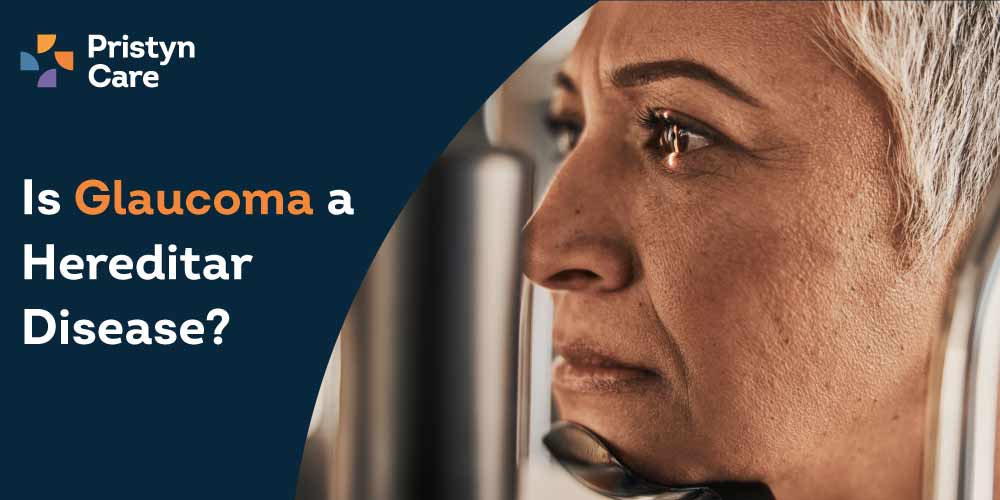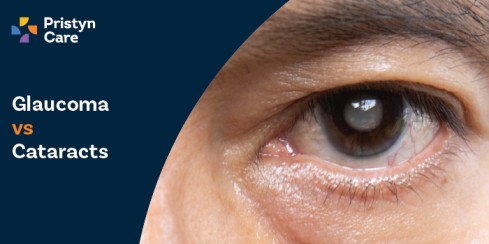![]() Views: 71
Views: 71
Is glaucoma a hereditary disease?
This blog post will delve into answering the key question - is glaucoma a hereditary disease?.
Dedicated Support at Every Step!
Our Doctors are available 24 hours a day, 7 days a week to help you!
Call Us0806-541-7961Table of Contents
Introduction
We'll explore the connection between glaucoma and genetics, shedding light on how your family history might influence your susceptibility to this ailment. When it comes to dealing with diseases like glaucoma, knowledge is indeed power. By understanding the hereditary aspects of glaucoma, we can equip ourselves better for early detection and effective management. So, let's unravel the mystery behind the cause of glaucoma together.
No Cost EMI, Hassle-free Insurance Approval
Understanding Glaucoma
Glaucoma, a common eye condition, is often associated with a build-up of pressure inside the eye. It tends to affect people in their later years, but it can strike at any age. Understanding the cause of glaucoma and recognising its symptoms early is crucial for effective treatment.
There are mainly four types of glaucoma:
- Primary open-angle glaucoma: The most common variant, it develops slowly with few symptoms in the early stages.
- Angle-closure glaucoma: A rare type characterised by rapid symptom development such as sudden eye pain.
- Secondary glaucoma: Occurs as a result of an underlying eye injury or condition.
- Developmental or congenital glaucoma: This form affects babies and young children, is a rare but potentially serious type.
The cause of glaucoma is often linked to an increase in fluid pressure within the eye. However, it's important to note that not all cases are due to high pressure; sometimes, damage can occur at even normal pressure levels.
Symptoms of glaucoma often vary according to the type and stage of your condition. For instance, primary open-angle glaucoma doesn't exhibit noticeable symptoms until significant vision loss occurs. On the other hand, symptoms like blurred vision, redness in the eyes, severe eye pain accompanied by nausea, and sudden visual disturbances may indicate a severe form like acute angle-closure glaucoma.
Regarding risks, certain factors increase your likelihood of developing this disorder:
- Age: Being over 60 significantly raises your risk.
- Genetics: A family history of glaucoma increases your risk considerably.
- Medical conditions: Diabetes, heart disease and hypertension can predispose you to this eye complication.
Role of Genetics in Glaucoma
In recent years, various scientific studies have drawn our attention to the substantial role that genetics plays in contributing to the cause of glaucoma. It's crucial to understand that glaucoma isn't simply an age-related condition but can also be genetically predisposed.
One might ask, how does the reason for glaucoma relate to genetics? Glaucoma is typically characterised by elevated intraocular pressure (IOP), which means higher pressure inside your eyes. This excessive pressure can damage the optic nerve, leading to vision loss. Certain genes are responsible for regulating this pressure. Mutations or alterations in these genes could result in abnormal IOP regulation and, subsequently, potentially trigger glaucoma.
Here are some key points highlighting the link between glaucoma and genetics:
- Numerous research studies have identified specific genes like MYOC and OPTN associated with primary open-angle glaucoma, the most common type of glaucoma. Mutations in these genes can increase a person's risk of developing the disease.
- Familial patterns: If a member of your family has been diagnosed with glaucoma, your risk factor for developing it increases substantially. This suggests a strong genetic influence.
- Genetic counseling is now available wherein individuals with a family history of glaucoma can undergo genetic testing. This assists in identifying those at high risk early on and implementing preventive measures.
Understanding this genetic facet of glaucoma aids doctors in making accurate diagnoses and formulating effective treatment plans. Furthermore, it encourages individuals who are genetically predisposed to be proactive about their eye health. While it's important not to view all instances of glaucoma as purely genetic, there’s no denying that understanding one's genetic makeup can provide valuable insights into your potential risk factors. Stay informed about your family's medical history and ensure regular eye check-ups for early detection and effective management of glaucoma.
The Genetic Link in Different Types of Glaucoma
A pertinent question often asked is, what exactly is the reason for glaucoma? While several factors contribute, latest research has shed light on a significant genetic link with different types of glaucoma.
Primarily, two forms of glaucoma are discussed here: primary open-angle glaucoma and closed-angle glaucoma. The genetic link is uniquely different in each type.
- Primary open-angle glaucoma: Multiple genes are associated with this most common form of glaucoma. These genetic abnormalities disrupt the eye's drainage system, leading to increased pressure and damage to the optic nerve.
- Closed-angle glaucoma: This less common type has been linked to mutations in a specific gene that causes the physical structure of the eye to change, blocking fluid drainage and increasing eye pressure.
Understanding the reason for glaucoma's occurrence and its connection with our DNA is crucial as it can help predict risk and aid in early detection. Ultimately, whether it's primary open-angle or closed-angle, the relationship between glaucoma and genetics continues to be an area of intense scientific exploration.
Risk Assessment for Glaucoma
Glaucoma is a serious and often silent vision-related condition that can lead to irreversible blindness if not detected and treated early. Let's delve into the factors contributing to an increased risk of developing glaucoma, which can help us understand the cause and reasons behind getting this disease.
- Age: As we grow older, the risk of getting glaucoma increases significantly. Therefore, for people above 60 years, regular eye check-ups become crucial.
- Family History: Genetics plays a significant role in developing glaucoma. If your parent or sibling has glaucoma, you are more likely to develop it. Hence, knowledge about family history is vital in assessing one’s susceptibility to the disease.
- Medical Conditions: If you have diabetes or high blood pressure, your chances of getting glaucoma rise considerably. Regular screenings can be helpful in preventing the onset of such conditions.
- Eye Injury or Surgery: Any injury or surgery to the eye can cause internal changes leading to glaucoma. Follow-up checks after an injury or surgery can prevent this condition from setting in.
- Ethnicity: Certain ethnic groups are at higher risk for certain forms of glaucoma. For example, people of African descent are more prone to open-angle glaucoma, while those of Asian origin are likely to develop angle-closure glaucoma.
Understanding these risk factors provides insights into the reason for developing glaucoma. However, having one or more of these risk factors does not necessarily mean you will get the disease; it only increases your susceptibility. Regular screenings, especially for people with a family history of the disease, are crucial as early detection is key to managing and treating this condition effectively.
Knowing your risk profile will help you and your doctor make informed decisions about regular screenings and preventive measures you can take to protect your eyesight. Don’t wait till it's too late - remember, prevention is always better than cure!
Prevention and Management Strategies for High-Risk Individuals
Glaucoma is a challenging condition, but knowing the glaucoma cause can help you take preventive measures. Understanding the reason for glaucoma allows us to devise effective strategies to manage and prevent it. Here are some preventive and management methods for individuals who are at high risk due to their genetic make-up:
- Regular Eye Check-ups: Regular visits to your ophthalmologist will help detect early signs of glaucoma. Early detection increases the chances of successful treatment.
- Controlled Blood Pressure: Uncontrolled hypertension may increase your risk of developing glaucoma. Therefore, keep a regular check on your blood pressure levels.
- Manage Stress: High levels of stress can elevate eye pressure. Practice relaxation techniques like deep breathing exercises or yoga to keep stress under control.
- Healthy Lifestyle: Maintain a balanced diet rich in fruits and vegetables. Regular exercise can also help keep intraocular pressure low.
- No Smoking: Evidence suggests that smoking may increase the risk of glaucoma. If you smoke, consider quitting or reducing it.
- Avoid Excessive Caffeine: Too much caffeine can increase eye pressure. Limit your intake if you're at high risk.
Remember that while genetic predisposition does increase your chances of developing glaucoma, proactive measures can significantly influence its occurrence and progression. Keep these tips in mind to safeguard your vision against this potent threat.
Importance of Early Diagnosis and Treatment
Glaucoma, a serious eye disease, requires immediate medical intervention. The reason for glaucoma often includes genetics, which can cause irreversible blindness if not treated promptly. Detecting glaucoma at an early stage can help manage the disease effectively. Here's why:
- Controls Progression: Timely diagnosis can halt the progression of glaucoma, in turn, preventing further harm to your eyes.
- Prevents Severe Vision Loss: Early treatment can save your eyesight and avoid severe vision loss.
- Better Management: With early diagnosis, doctors can devise an effective treatment plan.
Remember, delaying a checkup could cause irreversible damage to the glaucoma. Book your eye test today!
Conclusion
In conclusion, the blog has established that glaucoma does indeed have a hereditary aspect. Familial patterns of this condition have been observed, making 'glaucoma and genetics' a significant area of study. However, it's crucial to remember that genetics is only one piece of the puzzle; other factors can also contribute to the glaucoma cause.
To manage and potentially prevent this disease, proactive healthcare practices are crucial. Regular eye checkups and early detection remain our best defence against the damaging effects of glaucoma. Awareness about the reason for glaucoma, including its hereditary nature, is a step towards better eye health for all.











